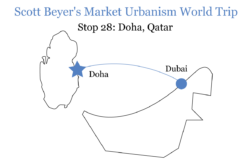The Modernization of Arabia
The wealthy, oil-rich countries of the Gulf Cooperation Council pursue economic openness and extreme growth to diversify beyond energy.
The Arabian Gulf has experienced tremendous growth the last 60 years. Cities like Doha, Dubai, Riyadh and Abu Dhabi have become synonymous with wealth and power. This is thought to be a story of oil—and there’s still lots of that. But it’s many other things: a cohesive civic culture, mixed with an economic diversity built around low taxes, minimal regulation, immigration and openness to growth.
First for a distinction, because not all Arabic countries are alike. Travel the broader Middle East-North Africa region—as I did recently on my 1.5-year Global South tour—and you’ll still find economic dysfunction in “old school” Arabic countries like Morocco, Yemen and Pakistan. But a crop of smaller “new money” ones concentrate along the Gulf. They have skyscraper districts, giant beautiful new mosques, fancy malls, modern highways, and major activity in finance, technology and tourism.

These latter nations now collaborate in the framework of the Gulf Cooperation Council (GCC). The entity’s goal, writes Al-Jazeera, is to provide “economic, security, cultural and social cooperation between the six states,” including Bahrain, Kuwait, Oman, Qatar, Saudi Arabia and the United Arab Emirates (UAE).
It wasn’t always this way. Even into the 1950s, the UAE’s economy was based on agrarian trades like pearl diving. Qatar still had a fishing-centric economy. Oil was found in both countries, and they now have among the world’s highest per capita GDPs.
Oil extraction remains an important part of the whole region: in 2016, The Economist noted that energy accounts for “over 80% of GCC government revenues”. This has continued in years since, as the countries continue expanding extraction to offshore sites.
But the countries have sought to diversify their economies; Bahrain and Oman will deplete their oil reserves within the next two decades, and by 2040 global demand drops will impact the whole Gulf.
The UAE—specifically Dubai—shows how diversification could look. It’s built more on trade and tourism than oil, which never was found to great degree there. This was the result of specific policies (or un-policies, one might say). Dubai has no income taxes, and only a 5% VAT. It has relatively liberal land use laws. Its robust trade is facilitated by special economic zones, such as the one enshrouding the massive Jebel Ali Port. Dubai embraces migration, with large airports and simple visa processes, meaning 88% of residents are from elsewhere. The ruling sheikhs, who think of themselves as CEOs, writes Jim Krane in City of Gold, reinvest their profits to build yet more infrastructure and tourist attractions.
Other GCC countries take this business friendly approach to foster investment. All 6 countries have jumped in ease-of-doing-business rankings, and are all now in the top 100. All of them serve as tax havens to some degree. Many have leveraged technology to reduce transaction costs, moving governing functions online.
They have bought into the special economic zone concept—at least 70 exist throughout GCC nations. The aforementioned Jebel Ali one accounts for 24% of Dubai’s foreign direct investment. Saudi Arabia recently launched four SEZs, which will have low corporate taxes for at least 20 years, generous import allowances, and flexible movement of workforce talent.
Saudi Arabia is also building a massive new development, Neom, in its northwest. It will be a “linear city” consisting of two wide buildings with a capacity of 9 million, a logistics hub, and a large ski resort. The West Bay neighborhood of Doha, Qatar, went in 40 years from a stretch of desert to a bona fide skyscraper district. And there are many other examples that range from practical to outlandish.
Another factor helping these countries, which I’ll dig into next week, is a civic culture that seems odd to outsiders but works within. Like Scandinavian countries, GCC ones have civic cohesion. The “nationals” (for example the Emiratis of UAE , the Qataris of Qatar, etc.) are a privileged minority that unify around the Islamic religion, work the best jobs, and get dividend payments from any surplus. Visible in their white robes, they’re the ones driving fancy cars and shopping on weekday afternoons in the malls. The rest of the population are immigrants, who are poorly-paid to do grunt work and are expected to behave or be deported. It’s an interesting mix of economic liberalization and social conservatism that seems to work—a sort of Arabic “Texas Miracle”, but with much political autocracy thrown in.
GCC countries still need more diversification to ward against the price fluctuations and ultimate drying up of oil. For example, there’s less of an embrace here of bottom-up entrepreneurship than in other parts of the Global South. The growth approach is decidedly top-down, driven by royal families and large corporations.
But at least these countries understand that growth, however managed, brings a net positive to the average citizen. Even GCC’s embrace of oil is in itself a political decision; while they forage into the Gulf for more extraction, many U.S. states ignore their own natural gas reserves sitting beneath them. The region gives a glimpse of the wealth available if this and other liberalization measures take root in America.
Cover image features the Lusali neighborhood of Doha, Qatar.
Graphic Credit: The Market Urbanist.
Catalyst articles by Scott Beyer | Full Biography and Publications
